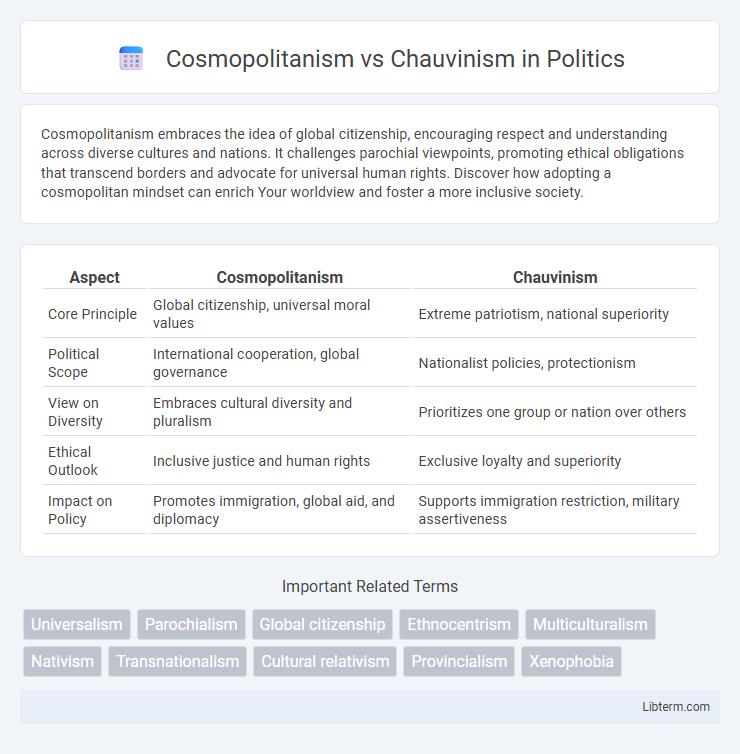Cosmopolitanism embraces the idea of global citizenship, encouraging respect and understanding across diverse cultures and nations. It challenges parochial viewpoints, promoting ethical obligations that transcend borders and advocate for universal human rights. Discover how adopting a cosmopolitan mindset can enrich Your worldview and foster a more inclusive society.
Table of Comparison
| Aspect | Cosmopolitanism | Chauvinism |
|---|---|---|
| Core Principle | Global citizenship, universal moral values | Extreme patriotism, national superiority |
| Political Scope | International cooperation, global governance | Nationalist policies, protectionism |
| View on Diversity | Embraces cultural diversity and pluralism | Prioritizes one group or nation over others |
| Ethical Outlook | Inclusive justice and human rights | Exclusive loyalty and superiority |
| Impact on Policy | Promotes immigration, global aid, and diplomacy | Supports immigration restriction, military assertiveness |
Defining Cosmopolitanism and Chauvinism
Cosmopolitanism represents an ethical stance emphasizing global citizenship, cultural openness, and the belief in universal human rights that transcend national boundaries. Chauvinism, in contrast, denotes an exaggerated and aggressive patriotism or loyalty to a specific group, often leading to intolerance and a sense of superiority over others. While cosmopolitanism promotes inclusivity and mutual respect among diverse populations, chauvinism fosters exclusivity and ethnocentrism.
Historical Roots of Cosmopolitanism
Cosmopolitanism traces its historical roots to ancient Stoic philosophy, which emphasized global citizenship and the unity of all human beings beyond local affiliations. The concept further developed during the Enlightenment, highlighting universal human rights and moral obligations that transcend national boundaries. These foundational ideas contrast sharply with chauvinism, which centers on extreme patriotism and exclusive loyalty to one's own group.
The Rise of Chauvinistic Ideology
The rise of chauvinistic ideology reflects a resurgence of extreme patriotism and intolerance toward external cultures, fueling nationalist movements and xenophobic policies globally. This shift challenges cosmopolitan ideals by promoting exclusion and hierarchical superiority, undermining multicultural cooperation and global solidarity. Data from recent social studies reveals increased support for nationalist platforms in over 30 countries, correlating with growing anti-immigration sentiment and cultural protectionism.
Key Principles of Cosmopolitan Thought
Cosmopolitan thought centers on the principle that all human beings belong to a single global community, emphasizing universal moral values and human rights that transcend national or cultural boundaries. It advocates for inclusivity, mutual respect, and global justice, promoting cooperation beyond ethnic, racial, or national divisions. This worldview opposes chauvinism, which prioritizes exclusive loyalty to one's own group or nation, often leading to intolerance and ethnocentrism.
Core Beliefs Driving Chauvinism
Chauvinism is driven by beliefs in superiority and unwavering loyalty to one's own group, often coupled with a dismissive or hostile attitude toward outsiders. Core tenets include ethnocentrism, a sense of entitlement to privilege, and the conviction that one's culture, nation, or identity is inherently better than others. These beliefs fuel exclusionary practices and resistance to multiculturalism, contrasting sharply with the inclusive values upheld by cosmopolitanism.
Impacts on Globalization and International Relations
Cosmopolitanism promotes global interconnectedness and multicultural cooperation, enhancing international diplomacy and economic integration by valuing diversity and shared human rights. Chauvinism fosters nationalistic pride and exclusionary policies, often leading to increased conflicts, trade barriers, and diplomatic tensions that hinder globalization. The clash between these ideologies significantly shapes global governance structures, influencing the balance between collaborative international frameworks and protectionist nationalism.
Social and Cultural Implications
Cosmopolitanism promotes global interconnectedness, encouraging cultural exchange, inclusivity, and respect for diversity, which fosters social cohesion and reduces ethnocentric biases. Chauvinism, characterized by excessive patriotism and cultural superiority, often leads to social polarization, discrimination, and exclusion of minority groups. The tension between these ideologies significantly shapes policies on immigration, multicultural integration, and national identity, impacting societal harmony and cultural development.
Contemporary Debates and Case Studies
Contemporary debates on cosmopolitanism versus chauvinism focus on global citizenship ideals clashing with nationalist and ethnocentric identities, prominently seen in migration policies and international cooperation forums. Case studies like the European Union's handling of refugee crises and the rise of populist movements in the United States illustrate tensions between inclusive global ethics and exclusive national loyalties. These debates underscore challenges in balancing universal human rights with sovereign state interests in an interconnected world.
Cosmopolitanism and Chauvinism in Politics
Cosmopolitanism in politics advocates for global citizenship, emphasizing inclusivity, human rights, and cooperation across national boundaries to address transnational issues like climate change and migration. Chauvinism, by contrast, promotes excessive patriotism and nationalism, often leading to exclusionary policies and resistance to international collaboration. The tension between these ideologies shapes policy debates on immigration, trade, and international law enforcement.
Pathways Toward Inclusive Societies
Cosmopolitanism promotes global citizenship by encouraging openness, diversity, and mutual respect across cultures, fostering inclusive societies where individuals prioritize shared human values over nationalistic biases. Chauvinism, characterized by excessive loyalty to one's own group and rejection of others, obstructs social cohesion and undermines efforts toward equality and inclusion. Pathways toward inclusive societies include promoting intercultural dialogue, implementing inclusive policies, and educating citizens on the benefits of embracing global interconnectedness and pluralism.
Cosmopolitanism Infographic

 libterm.com
libterm.com